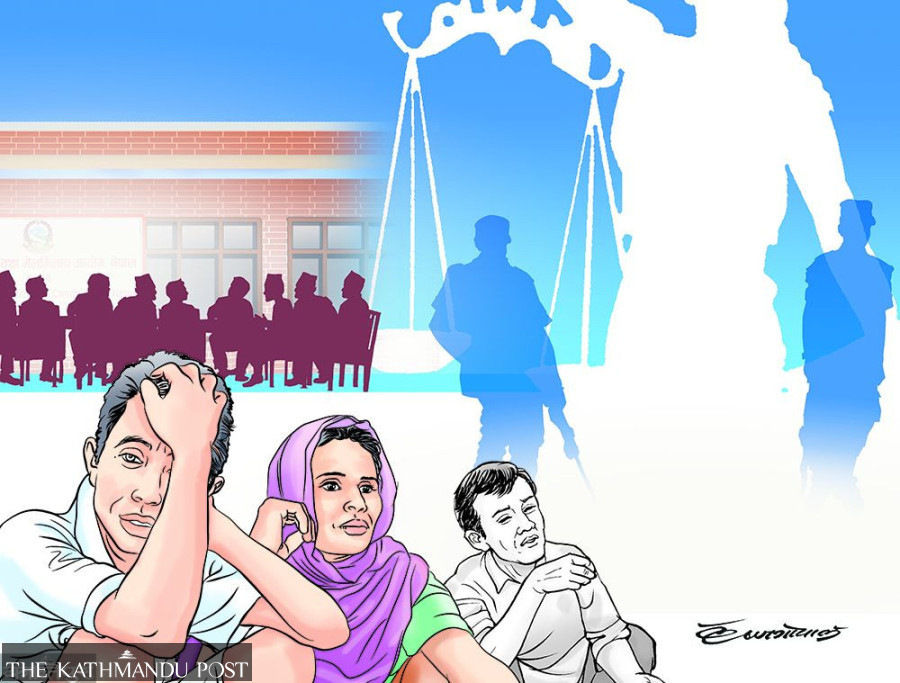National
Transitional justice commissions get one more extension but legal issues remain
MPs accuse government of not showing urgency to find consensus on amending the law.
Binod Ghimire
Amid Parliament’s failure to find consensus in amending the Enforced Disappearances Enquiry, Truth and Reconciliation Commission Act, the government has yet again extended the terms of two transitional justice commissions.
The Cabinet on Tuesday decided to extend the terms of the Truth and Reconciliation Commission and the Commission of Investigation on Enforced Disappeared Persons until mid-July. The terms of the commissions constituted in February 2015 expire on Monday. The government used the authority to remove the difficulties as per section 42 of the Act to give the commissions additional six months. However, the decision must be presented in Parliament within 30 days of its commencement.
In principle, the authority to remove the difficulties can be used only on rare occasions. But the government has given the commissions a fourth consecutive extension citing the same provision. As the commissions cannot take any decisions other than running day-to-day administration without office-bearers, they will remain defunct.
The two bodies have been defunct since July 2022 after the government decided to extend the terms of the commissions without retaining their chairmen and members. Against the government’s claim that the amendment bill would be endorsed by October 2022, which will also open the door for recruiting new office bearers, there has been no progress even in the latest extension.
Conflict victims say while they don’t object to another term extension, they take serious exception to the government and political parties conspiring to make the commissions defunct and push the justice delivery process. Gita Rasailee, vice-chairperson of the Conflict Victims National Women Network, said the term extension was necessary to keep the commissions alive but the decision serves no purpose.
“We need an answer about why it is taking so long to amend the Act. When will the commissions get their office bearers and resume their work,” she said. “By extending the terms, the government has gotten an additional six-month cushion to delay legal amendments.”
The Law, Justice and Human Rights Committee of the House of Representatives hasn’t been able to finalise the bill as the lawmakers from the ruling and the opposition parties remain at odds over various provisions in the bill. The discussion in the committee on Wednesday also failed to give a way out.
After discussing the bill for over five months, the 11-member sub-panel on October 10 presented an incomplete bill to the committee. It could not arrive at a consensus on four issues, with the classification of amnestiable and non-amnestiable crimes being a major bone of contention.
Despite prolonged discussions, the sub-committee couldn’t decide whether to categorise arbitrary killings or all killings except those that occurred in clashes as a serious violation of human rights. The committee also could not agree on what happens in case the victims of rights violations refuse to reconcile. There was also no solution on how to address the concerns of those who were affected by the conflict even though they were not directly involved in it.
Several people have lost their lives and scores of others have been injured in landmines planted during the insurgency, but the transitional justice process has failed to address their cases. Also, cross-party lawmakers could not arrive at a consensus on reducing sentencing. Though there is an agreement that the penalty for the perpetrators who cooperate in the investigation can be reduced, they have yet to agree on the extent of such reduction.
On Wednesday, Minister for Law, Justice and Parliamentary Affairs Dhanraj Gurung reiterated that attempts to find a meeting point among major parties continue.
“We will be in discussions with members of this committee for the next 8 to 10 days. There will be discussions at the top [political] leadership as well,” said Gurung in the House committee. “I am confident that there will be consensus and the bill will be endorsed by the upcoming winter session of Parliament.” He had given a similar statement at a meeting of the House committee on December 22.
Opposition lawmakers accused the government of not showing the seriousness and urgency to find consensus.
Mahesh Bartaula, whip of the CPN-UML who also is a member of the committee, said three months after the sub-committee submitted its report without resolving the dispute, the government is yet to clarify its position on the issues.
The law minister must create grounds for consensus, he told the Post. “Victim-centric law is our bottom line: there will be no compromise on this. The ruling parties have a clear majority in Parliament. They can push the bill through Parliament if they want."
Though the minister didn’t say when the next House session will start, the government is waiting for the National Assembly elections scheduled for January 25 to call the new House session.
On February 26, 2015, the Supreme Court had directed the government to amend the Act’s around half a dozen provisions that allowed amnesty even in cases of serious human rights violations.
Amending the Act is a must to prosecute the incidents of serious crimes and human rights violations that were perpetrated by the Maoist rebels and the state security forces during the decade-long Maoist insurgency.
But despite the court’s order and calls from conflict victims and human rights organisations to amend the Act, subsequent governments have done little to address the concerns of conflict victims.
The two transitional justice bodies were formed in 2015 with a mandate to investigate and prosecute conflict-era crimes within two years. Over the years, they have undergone several term extensions, but accomplished very little of their mandate.
While the truth commission has 63,718 complaints registered, there are around 2,400 cases registered with the disappearances commission.




 9.83°C Kathmandu
9.83°C Kathmandu














